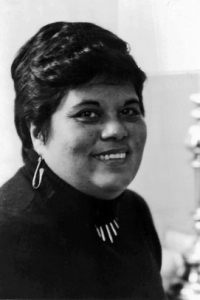
By: Brian Flood
The groundbreaking career and scholarship of Louise Año Nuevo Kerr, the late UIC professor and administrator, was honored Sept. 16 at Student Center East when more than 225 scholars, community leaders, students and artists gathered for the first “Mexicans in Chicago” conference. Kerr, who died in August 2015, was known for her community engagement and research on Mexicans and Mexican-American immigration to Chicago. She was also associate professor emerita of history and former associate vice chancellor of academic affairs.
Hosted by the Latin American and Latino studies program, the conference featured sessions inspired by Kerr’s pioneering dissertation, “The Chicano Experience in Chicago: 1920–1970,” a widely influential work in Latino studies and Mexican American history. “Her vision to be engaged to start this extensive field of research and render Mexicans visible in the history of Chicago is one of the most important things that has happened here at UIC,” said Amalia Pallares, director of Latin American and Latino studies.
Kerr’s often-cited study analyzes the urbanization of Chicago and explores the origins and growth of the city’s Mexican population, much of which involved job opportunities in the railroad, packing and steel industries.
According to opening keynote speaker Deena J. González, a historian from Loyola Marymount University, Kerr became the fourth Latina historian in the country when she received her Ph.D. in history from UIC in 1976. “It is astonishing to think what it must have taken Louise Año Nuevo Kerr to investigate, research, write and bring to the forefront this invisible community,” said González, an expert in Chicana history, U.S. social history, and race, gender and sexuality.
She shared insight into the rise of Chicana feminism, her friendship with Kerr, the growth of the Latino studies field, and Kerr’s legacy and continued importance. “In Louise’s work was this strong central focus on both immigrant experiences among Mexican origin populations and the idea of an ethnic history that viewed those populations through non-deficiency lenses,” González said. “It helped establish a discipline that is thriving today and drawing students who come to the study of Latina and Latino people with entirely different approaches and interests.”
“Our way of life all across the country, and not just in the borderlands or in the far west, is utterly dependent on undocumented workers and that is why Louise’s work was and remains so important,” González said. “I think Louise would be very pleased, both about how her foundational work motivated this kind of work, but also just in watching it grow and change right before our eyes.” The vast history and legacy of Mexicans and all underrepresented communities aren’t fully understood in today’s popular discourse, Pallares said. “It is events such as these conferences that not only help set the record straight by contributing to our growing knowledge, but also enables us to understand how our past can inform our present and our future,” she said.
Photo Caption: Louise Año Nuevo Kerr








